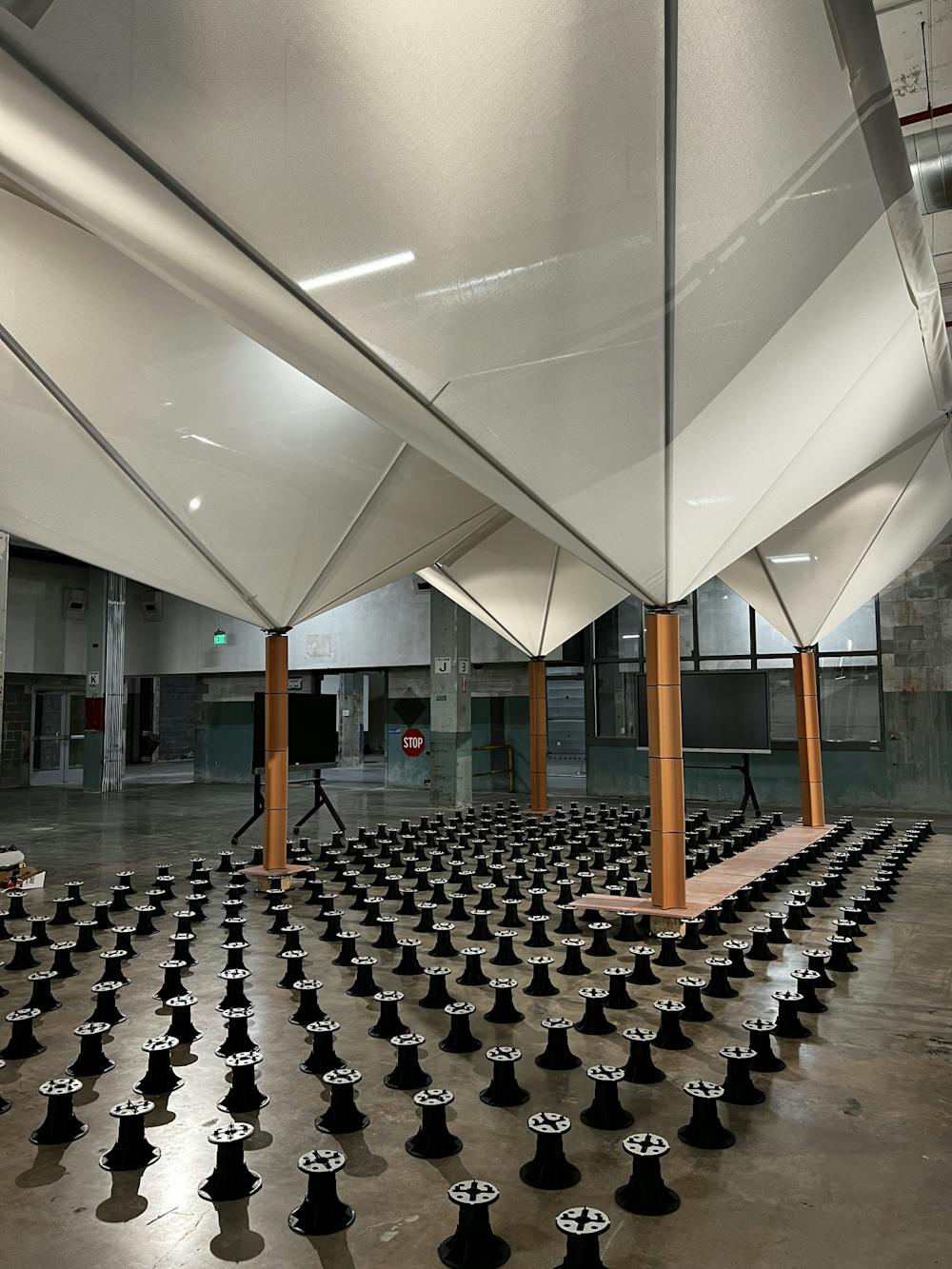Juan José Castellón talks inspiration behind new exhibit

Juan José Castellón’s award winning exhibit “Building Ecologies: Collective Urban Infrastructures in Houston” is now open for visitors at POST Houston. Partnering with the TEDxHouston Countdown event, this project features sustainability and attempted solutions to the ongoing climate crisis through rooftop urban infrastructure.
In an ongoing research collaboration with different departments, Castellón, an architecture professor at Rice, has created a sustainable architectural structure with a practical function.
“I am designing and building lightweight structures that can be installed on rooftops or in open spaces … these are structures that can collect water, store it and reuse it for different purposes, such as irrigation systems for farming or heating and cooling systems,” Castellón said.
Castellón said he finds the intersection between architecture and engineering fascinating, often combining the two subjects as a source of inspiration for his research and projects.
“This [project] is not in the typical architectural reference that you have because it’s a bit in the threshold between engineering and architecture. I like this spacing between [the two subjects],” Castellón said.
Qilin Li, a civil and environmental engineering professor developing research on water purification technologies, has been collaborating with Castellón to add functional value to the architectural infrastructures.
“[This is] a structure that can provide a space for the people who live in the building, but it’s also a structure that can be used to collect stormwater and at the same time [purify] that stormwater to the degree that’s suitable for a local end use,” Li said.
Outside of his collaborations with fellow Rice faculty, Castellón said that his students were also crucial in developing the project.
“I also work on the project in my design studio. My design studio almost works like a laboratory, and we test different ideas with students,” Castellón said.
In collaboration with Rice Carbon Hub, Castellón has been able to gain understanding and access to more sustainable and environmentally friendly materials.
“So at the Carbon Hub, we are working on a new class of materials that can be made sustainably from hydrocarbons. There are no carbon dioxide emissions because the carbon stays in the material,” Matteo Pasquali, professor of chemical and biomolecular engineering and director of the Carbon Hub, said.
In an attempt to organize a bigger event in order to put all the parts of the project together, the opening of this exhibit featured numerous events, such as a TED Talk, a competition and openings of different installations.
“The TED Talk was to invite people to speak about the future of ecology and the future of Earth and sustainability,” Castellón said. “The competition was for young architects and students [who] are looking for solutions to rethink how we can build a better city and create better dialogue with the environment. And then the installation is to create a place in the city for meeting and discussing and sharing different ideas.”
Castellón said he seeks inspiration for his projects in nature. He especially appreciated the surrounding geography of Houston.
“Nature is a big source of inspiration for me. And being in Houston, I always talk about the rain and the trees,” Castellón said. “What I do with architecture is try to create a dialogue with this natural ecosystem.”
Castellón’s achievements with his recent exhibit echo this collaboration across ecosystems and disciplines.
“I applaud Juan José for conceiving and then bringing to life this important, timely project that will engage Houston in a powerful way,” President Reginald DesRoches wrote in an email to the Thresher. “The collaborative, interdisciplinary nature of this exhibit is really what Rice is all about and is what will help us find solutions to the pressing challenges of today and the future.”
More from The Rice Thresher

The post on compost: The latest of composting at Rice
Heavier than a commercial plane: Rice has composted one million pounds of food waste in total since May 2024 through the Moonshot Compost program. More bins were added due to demand at the beginning of the 2024-25 school year, according to sustainability coordinator Kristianna Bowles.

From gardening to global music: 5 must-take courses
Crafting your schedule for next semester requires balancing your curiosity and graduation requirements. Do you want to pique your interest while adding value to your academic journey? Take a look at the list below.

Robots do the brewing at CERĒS coffee shop
It’s 8:45 a.m., and you walk into Rice Coffeehouse to find the line wrapped around the hallway of the student center. Begrudgingly, you skip out on your morning coffee and start estimating the perfect time to return when they might not be as busy. As you leave Chaus empty-handed, you realize you could go to Dandelion Cafe if you really wanted a morning drink. But that would mean going into debt.

Please note All comments are eligible for publication by The Rice Thresher.